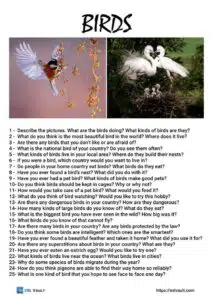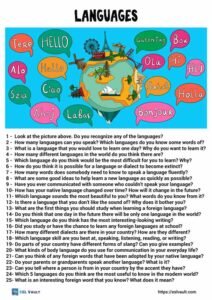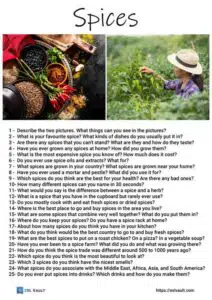Shopping discussion questions.
Most people like shopping and everybody does it. This is a handy topic to get your students talking about as everyone can relate to it. Here we have 2 shopping discussion questions worksheets, the first one above is much easier than the second.
Make sure to pre-teach the terms haggle, bargain, queue, cut in line, compare, second-hand, groceries and, window shopping before starting the conversation activity.
The shopping discussion questions are –
Where do you buy your groceries?
What things do you buy online?
Do you like shopping? How often do you go shopping?
Do you ever go window shopping?
Are there any stores in your city/town that you don’t like?
Do you ever buy second-hand things?
What is the most expensive thing you have ever bought?
Are you saving up for anything?
When you buy something, do you “shop around” and compare prices?
Do you prefer shopping in malls, markets or streets?
Who do you like to go shopping with?
What did you buy the last time you went shopping?
What is the worst thing you ever bought? Why was it so bad?
What is your favourite store for shopping?
What things do you pay cash for? What things do you pay for by credit card?
What things are cheap in your country?
Do you haggle or bargain when you shop?
Do you sometimes buy things that you don’t need?
What kind of things do you buy most? (books. clothes etc)
Have you ever had to take something back to a shop?
Do people in your country jump queue or cut in line?
Are there special shopping days in your country?
What is something that you want to buy, but think you never will?
What is the last present you bought for someone else?
A similar discussion worksheet that may also be useful for your class is the money conversation questions printable.

Shopping discussion questions 2
The most challenging terms in this speaking activity include – grocery, farmers’ market, flea market, garage sale, disappointed, mall, shoplifting, retail therapy, advertising, annoy, decide, brand, and bargain (noun).
The second set of shopping discussion questions are –
What day and time do you usually go grocery shopping? Why shop at this time?
Are there any farmers’ markets or flea markets near your home?
Do you take plastic bags with everything you buy or bring your own bags?
What different things do you think men and women like buying?
Have you ever bought anything interesting at a garage sale? What was it?
If you could go on a shopping holiday, which country would you go to? Why?
Have you ever bought something and felt disappointed afterward? What was it?
Is there a mall near your home? How often do you visit it?
If you could open a shop, what kind of shop would it be?
Is shoplifting a problem where you live? What happens to people who get caught?
What is something that you feel you spend too much money on?
What is retail therapy? Do you think it helps cheer people up?
Does advertising make you buy things? How do you choose a place to shop?
How much money do you spend on shopping each month?
What is something that you would never buy secondhand? Why not?
If you could spend $5000 dollars in one store, which store would you choose?
What do you think will be the next thing that you buy? Where will you buy it?
Where would you go to buy a new jacket? How much would it cost?
What are some things about shopping and supermarkets that annoy you?
Do you think about where something is from before you decide to buy it?
What is the most common way that people pay for things where you live?
What is your favorite clothing brand? What is your favorite brand of electronics?
What would you like to buy your best friend on his/her birthday?
What is the best bargain that you have ever bought? Where did you get it?
For further advanced discussion on this topic check out the consumerism conversation questions.

Shopping idioms
If you talk shop, you talk only about work. This is generally thought of as boring.
Something that costs an arm and a leg is overly or very expensive.
If you buy something that is very cheap compared to its value, you can say it is a steal.
If you buy a lemon, you buy something that is of no value or useless. An example might be buying a car that keeps breaking down or a watch that doesn’t keep the time correctly.
A shopping spree is when a person buys a lot of things in a very short amount of time. For example, people often go on shopping sprees before Christmas day to buy presents for many people.




